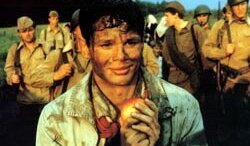
|
| |
| |
|
|
| |
|
|
| |
Europa, Europa
© Unknown - all rights reserved
|
| |
|
|
| |
 |
| Tookey's Rating |
|
|
6 /10
|
| |
| Average Rating |
|
|
8.11 /10
|
| |
| Starring |
| Marco Hofschneider, Julie Delpy, Andre Wilms |
| Full Cast > |
|
|
|
| |
Directed by: Agnieszka Holland 
Written by: Agnieszka Holland, Paul Hengge, from Solomon Perel's book Memoires
|
|
| |
|
|
| Tookey's Review |
|
| Pro Reviews |
|
| Mixed Reviews |
|
| Anti Reviews |
|
| Cast |
|
| |
 |
| |
| Released: |
1991 |
| |
|
| Genre: |
DRAMA
FOREIGN
BIOPIC
WAR
WORLD WAR II
|
| |
|
| Origin: |
France/ Germany |
| |
|
| Length: |
115 |
|
| |
|
| |
|
|
| |
|
|
A Jewish teenager (Marco Hofschneider, pictured) survives the Second World War by becoming a member first of Stalin's Komsomol, then of the Hitler Youth.
|
Reviewed by Chris Tookey
|
Some American critics hailed this as one of the best movies of its year. Some Germans heiled it as an insulting trivialisation of history (and the German committee responsible for such matters refused to nominate it for the Best Foreign Film Oscar). It's an amazing true story, clearly told, with deliciously ironic moments. The high point of absurdity comes when our hero's attempt to desert to the Russians is misinterpreted by his own side as a charge against an enemy position, and he becomes a German war hero. There's pathos, too, in his tentative romance with a young nazi blonde (Julie Delpy, who confirms the promise that she showed in Voyager).
The Polish director Agnieszka Holland cleverly uses the symbol of water to emphasise that our essentially innocent young hero is being re-baptised throughout the picture. The bathing images mean also that he is at his most naked and defenceless when unnerving things happen to him. She skilfully leads up the final deus ex machina coincidence which saves his life, by constantly raining things upon him from out of the sky: sweets from Stalin, bombs from the Americans, and finally a cleansing cloudburst.
There is much to admire in her direction, and the story never fails to grip. Yet it doesn't fully engage the emotions. The young leading actor, Marco Hofschneider, lacks depth and variety, and the picaresque narrative means that no one else has time to develop. But the basic flaw is the same one which renders Bernstein's musical version of Candide unsatisfying. The central character is essentially passive: he survives through luck, rather than skill or exceptional resilience. He also lacks internal life: even his dream sequences emphasise the grotesque nature of his situation, when they might more usefully have expressed his unexpressed feelings about being among enemies, or his agony at losing his identity. The director appears detached from her subject, so that the result is entertaining but oddly trivial: the stuff of which TV mini-series, not great films, are made.
|
|
|
|
|
|
